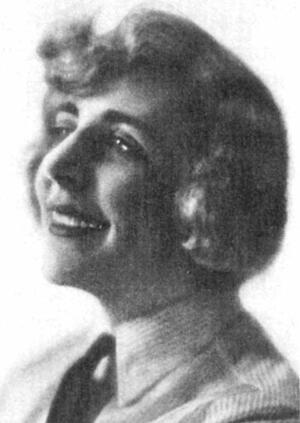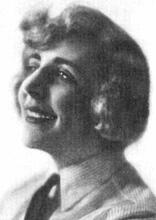Vicki Baum
Vicki Baum’s first short stories were published under her first husband’s name. In 1912, she left her job as a musician and turned to writing. In 1920, Baum published her first novel and from 1920 until 1931 worked as an editor for her publishing house. Baum’s first successful novel, Stud. chem. Helene Willfüer (1928), about a highly educated woman in male-dominated academia, sold over 100,000 copies within three years. Her major book, Menschen im Hotel (People in a Hotel, 1929), was adapted into a play and performed on Broadway in 1931, as Grand Hotel, later adapted into the 1932 Oscar winning film of the same name starring Greta Garbo and Joan Crawford. With Hitler’s rise in Germany, Baum emigrated to the United States, working as a scriptwriter and becoming one of the world’s best-selling authors.
Early Life and Writing Career
Born in Vienna on January 24, 1888, to Hermann, a tyrannical, hypochondriac father (a bank clerk who was killed in 1942 in Novi Sad by soldiers of the Hungarian occupation), and a mentally ill mother, Mathilde (née Donat), Vicki Baum grew up in a home in which reading was considered a “secret vice.” Her father forbade her to read for pleasure and was aghast when she won first prize in a literary competition. Her traumatic childhood was relieved only by her beloved grandfather, “a dear, ugly, cross-eyed old Jew.” She left school in 1904 to enroll at the Vienna Academy for Music and the Performing Arts, where she studied the harp. When she was just eighteen years old, she fled her oppressive parental home to marry Max Prels (Vienna, 1878–Berlin, 1926), a journalist who introduced her to the world of letters and the Viennese cultural scene, and under whose name her first short stories were published.
The marriage was short-lived and in August 1912 Baum moved to Darmstadt, where she was engaged by the opera house as Archduke’s Court and Chamber Musician. Here she met the conductor Richard Lert (b. Vienna 1885–1980), whom she married in 1916 and whom she followed from town to town. The couple had two sons, Wolfgang and Peter. After the birth of her older son, she sold her harp and turned to writing as a career.
In 1920 her first novel, Frühe Schatten. Die Geschichte einer Kindheit (Early Shadows: The Story of a Childhood) appeared, which was followed by Der Eingang zur Bühne (Stage Door). The latter was published by the Ullstein Verlag, with whom she published a new book almost every year. From 1920 until 1931 she also worked as an editor for this publishing house, whose owner, Hermann Ullstein, urged her to write a novel in which the protagonist would be “a capable young woman.” This led to her first great success, Stud. chem. Helene Willfüer (1928), which within three years sold over one hundred thousand copies. Dealing with the currently topical issue of the “New Woman,” the book describes the penetration of a highly educated woman into male-dominated academia and presented the new self-awareness and lifestyle of the “modern” women in the Weimar Republic. Her major book, Menschen im Hotel (People in a Hotel, 1929), was the first to introduce the genre of “hotel novels.” This story about a fading ballerina, a shady nobleman, and other types who in one weekend pass through an elegant hotel was told with an acute perception of minor detail, derived from a six-week stint as a parlor maid in a Berlin hotel. The book, which she completed in only three months, first appeared in serial form in the Berliner Illustrierten and was performed on stage in Berlin in 1929–1930 in a dramatic version by Baum herself and under the direction of Max Reinhardt. In 1931, it was performed on Broadway as Grand Hotel, becoming New York’s greatest success in thirty years.
Later Scriptwriting and Novels
MGM producer Irving Thalberg engaged Edmund Goulding (1891–1959) to direct the film version, which starred Greta Garbo (1905–1990) and Joan Crawford (1904–1977), grossed over one million dollars and won the 1933 Oscar for Best Film. Beginning in April 1931 Baum spent seven months in New York and Hollywood before returning to Berlin and her editing position with Ullstein. However, she soon realized that she wanted to emigrate to the United States. As she put it, distance and separation had taught her perspective, as in a love affair. After her stay in the United States she had a much clearer picture of what was happening in Germany. In 1932, after the elections for chancellor, she emigrated to the United States with her family, settling in the Los Angeles area where she worked for ten years as a scriptwriter, first for Paramount, then for Metro-Goldwyn-Mayer and finally as a freelancer. In this capacity she had only moderate success. Her husband was appointed conductor of the Pasadena Symphony Orchestra. In 1938, she became a citizen of the United States and henceforth wrote her works in English.
In the numerous novels she wrote in exile, such as Hotel Shanghai (1939), she returned constantly to the situation in National-Socialist Germany, where her books had been banned since 1935. She produced a novel every two or three years, writing over thirty in all. She became one of the world’s best-selling authors. Critics praised her gift for creating atmosphere and ranked her as a “high-level writer,” although in the years after World War II her works began to be regarded as trivia. She herself spoke of herself as a “first-class second-rate writer.”
Baum frequently depicted powerful, self-reliant women caught up in the social and economic turbulence of twentieth-century Europe and America. Among her later works were Hotel Berlin ‘43, set in Nazi Germany (1944) and Theme for Ballet (1958), which dealt with the American career of a beautiful Viennese dancer.
Vicki Baum died of leukemia in Hollywood on August 29, 1960. Her memoir, It Was All Quite Different, appeared posthumously in 1964.
Selected Works by Vicki Baum
Frühe Schatten (1920).
Schlosstheater (1920).
Der Eingang Zur Bühne (1920).
Die Tänze Der Ina Raffay (1921).
Welt Ohne Sünde (1922).
Die Andern Tage (1922).
Bubenreise (1923).
Ulle, Der Zwerg (1924).
Das Christsternlein (1924).
Der Weg (1924).
Tanzpause (1926).
Ferne (1926).
Miniaturen (1926).
Hell In Frauensee (1927).
Menschen Im Hotel (1929).
Stud. Chem. Helene Willfüer (1928).
Zwishenfall In Lohwinkel (1930).
Hell In Fauemsee (1930).
Parizer Platz 13 (1931).
Leben Ohne Geheimnis (1932).
Divine Drudge (1933).
Jape Im Warenhaus (1935).
Das Grosse Einmaleins (1935).
Die Karriere Der Doris Hart (1936).
Der Grosse Ausverkauf (1937).
Liebe Und Tod Auf Bali (1937).
Hotel Shanghai (1939).
Die Grosse Pause (1941).
Marion Lebt (1941).
The Ship And The Shore (1941).
Grand Opera (1942).
Das Weinende Land (1943).
Once In Vienna (1943).
Hotel Berlin ‘43 (1944).
Kautschuk (1944).
Hier Stand Ein Hotel (1944).
Mortgage On Life (1946).
Schiksalsflug (1947).
Headless Angel (1948).
Clarinda (1949).
Danger From Deer (1951).
Vor Rehen Wird Gewarnt (1952).
Kristall Im Lehm (1953).
The Mustard Seed (1953).
Tiburon (1953).
Written On Water (1956).
Flut Und Flamme (1956).
Einzamer Weg (1958).
Die Goldene Schule (1958).
Theme For Ballet (1958).
Verpfändetes Leben (1963).
It Was All Quite Different/I Know What I’m Worth (1964).
King, Lynda. “The Image of Frame: Vicki Baum in Weimar Germany.” The German Quarterly (Summer 1985): 375–393.
Idem. Bestsellers by Design: Vicki Baum and the House of Ullstein. Detroit, Michigan: 1988.
Wigoder, Geoffrey. Dictionary of Jewish Biography. New York: 1991.
Department of Germanic Languages, State University of New York, Albany (Vicki Baum Collection).
New York Public Library; Lincoln Center, and Yale University (Edmond Pauker Collection).
Lexikon Jüdische Frauen. Edited by Jutta Dick and Marina Sassenberg.




